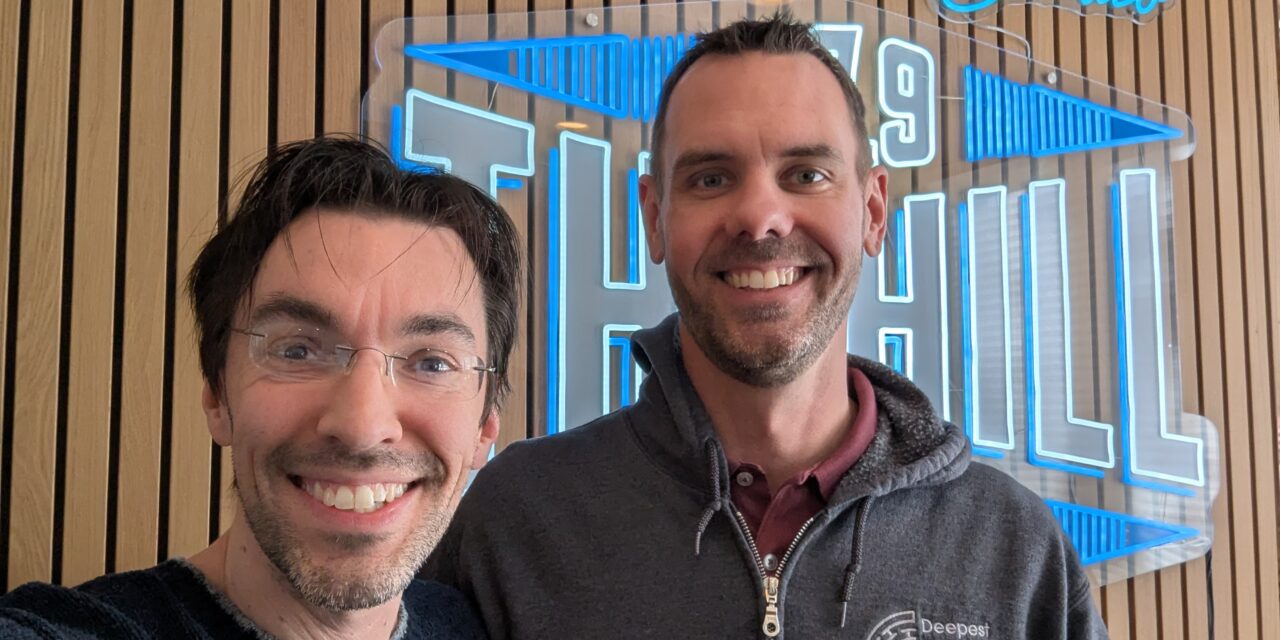It’s no secret that Americans today are more polarized than we were just a few short years ago – and that our polarization is making it hard for us to get along with each other on a day-to-day basis. What is the science behind that – and how can we use that science to try to overcome it?
Kurt Gray is a professor of psychology and neuroscience at UNC. He’s the director of the Deepest Beliefs Lab and the Center for the Science of Moral Understanding, and he’s also the author of “Outraged: Why We Fight About Morality and Politics and How to Find a Common Ground,” a new book due out in January.
Visit KurtJGray.com for more information on Gray and the new book.
97.9 The Hill’s Aaron Keck recently spoke with Gray about the book and the lessons we can all draw from it.
Click here to listen to their full conversation. The transcript below has been edited for clarity.
Aaron Keck: Before we get into the book, I have to talk about the subtitle: “Why We Fight about Morality and Politics and How to Find Common Ground.” Obviously that’s meant to be “Here’s why we fight about morality and politics, and here’s how to find common ground” – but there’s no Oxford comma in that title, so it could just as easily mean “why we fight about morality, and why we fight about politics, and why we fight about how to find common ground.”
Kurt Gray: Yeah, you know, people (do) fight about whether we should even try to understand people who disagree with us – especially right after the election. I’m an optimist about human behavior, I’m an optimist about the goodness of people, but many people are not, and they think we shouldn’t try to understand someone who disagrees with us. We should just try to dominate them or destroy them – but many fewer people want to ‘destroy America’ or our way of life than we think. That’s not how people are.
Keck: The one-sentence summary of the book (is): “wherever we are politically, we all start from the same place when it comes to morality – so the key to bridging that divide is recognizing that, acknowledging it, and appealing to that when we’re talking to each other, which is something we should be doing.” Right?
Gray: That’s right. No matter who you are, we have the same moral sense. We ultimately ground our moral judgments in trying to protect ourselves and protecting the vulnerable from harm.
Keck: How did you come to this work in the first place?
Gray: I mean, I could talk about the car chase, I could talk about my family –
Keck: Well, now you have to talk about the car chase!
Gray: So it was a dark night. It had just rained. We’re driving to the movie theater, me and my friends – and I’m racing, because I’m 16, and also we’re late, right? We’re roaring up the street, and a friend in the back seat says, “you’re gonna miss a turn.” So I take the wheel, I pull it sideways –
Keck: Sixteen-year-olds, am I right?
Gray: <laughs> I mean, goodness, I’m surprised I’m alive here to talk to you today. So there’s a car in the left hand lane, I cut it off. So I roll down my window to apologize – and he gets out of the car and says, “You’re f—ing dead!” He points at me, comes towards me, and I think, “oh, no” – so I slam on the accelerator, I zoom off, and he zooms off behind me. I’m just totally panicked. I zoom around these strip malls, he corrals me into the back of a Home Depot loading dock. So he gets out of the car, I unroll a window to apologize – (and) he starts slapping me, trying to unlock my door from the inside. He’s grabbing my collar, pushing me around.
Keck: This is not how most careers begin.
Gray: <laughs> Who knows? Psychologists are strange. (But) as he kept doing this, a friend in the backseat holds up a cell phone and says “stop it, or I’ll call the cops.” And then he says: “Yeah. You call the cops. And I’ll tell them what you did.”
And then, you know, he slaps me a couple more times, gets in his car and peels off. But that comment – so surprising. Like, what do you mean? Like, you’re the one physically assaulting me right now!
But the more I thought about it, the more I realized: he felt legitimately threatened. I mean, I literally almost killed him with the car. And I thought, you know, he’s so strong in his convictions, he’s so righteous, and yet so am I – and isn’t this interesting? I mean, at the time it wasn’t interesting, it was terrifying – but now I think this captures all sorts of moral disagreements that we have, (not just) in politics, but also everyday life, at work, at home. We’re so convinced that we’re the ones who are right. And they’re so convinced. And both of us are convinced for the same reason, which is that we feel aggrieved or victimized or harmed.
Keck: The woman in Central Park who called the cops on the bird watcher because he was Black in Central Park, and she felt threatened by that.
Gray: Exactly. And we can all look at that situation and say, “look, he’s just watching birds, he’s trying to do his thing, and she’s wrong.” But in everyday situations, where it’s a little blurrier who’s the victim, who’s harmed, who’s threatened – I think that creates a lot of moral discord.
Keck: So from that: we have this sense in our heads that, “oh, we are more polarized today than ever,” or “we get more outraged today than we ever have” – but (this situation) has always been with us, pretty much to the same degree forever.
Gray: Right. Outrage has always been a part of our lives, and it’s been part of how we can live together in groups successfully. Way back in time: (early humans) were terrified. We were getting eaten by big cats. Our children were picked off by big birds.
Keck: There’s an image on one of the pages (in your book) that’s very graphic.
Gray: Oh, yeah. There’s perfect fang holes in the skull of a prehistoric hominid that was found in a cave.
Keck: <laughs> Like, I can only imagine you’re so proud of that image being in the book.
Gray: <laughs> It was beautiful to find it. But (the point is), the idea that we’re apex predators – that’s totally not true, or historic.
Keck: We’re naked in the woods.
Gray: Right. Look at your fingernails. Are those the claws of a predator? I always encourage people, if you want to prove this for yourself, strip down, go naked in the woods at sundown, and see if you feel like some fearsome predator. Probably not. We’re preyed upon by big cats, big birds.
(But) we survive better in groups. We can look out for each other. Except: when you live in groups, you’ve got another threat, which is other people. They could hurt you, steal from you. So we needed a psychological tool to discourage people from being harmful to each other, to discourage violence, to encourage cooperation. And that’s morality. We have this sense that we shouldn’t harm others. And when people do harm others – we get outraged. And that allows us to punish them, kick them out of the group, whatever. Morality (evolved) so we could live together better. And that’s still with us today. We still feel that other people are harming us, we’re still worried about harm. And we use outrage to try to shape their behavior or kick them out.
Keck: So what’s different today? Or, why do people think things are different today?
Gray: What’s different today is: we’re a lot safer than we used to be.
No one feels this way – but really, we are so much safer today. This is an amazing stat, again from anthropology: every year our ancestors in tribes had a two percent chance of being murdered. Two percent! That’s one in fifty! That’s crazy! By the time you’re 50, you’ve rolled the dice so many times, you’re lucky to be alive. Today, even if you live in one of the world’s most dangerous cities – five years ago that was Tijuana, Mexico – your chance of being murdered is (closer to) one in 10,000. So much smaller. (Plus) we’re not getting picked off by giant eagles. And also, right now, we’re not dying as often in car accidents, because we have seat belts…
So we’re so much safer. And yet – it doesn’t feel that way. Because we still have this harm-based mind, this threat detector that needs to find threats.
Keck: There’s a line in the book, which is: “Parents during the industrial revolution had to worry about their child being dismembered by machinery; parents today have to worry about their child walking home.” But we still feel that sense of outrage, we just get outraged by smaller things.
Gray: Right.
Keck: And I’m reading this and I’m thinking, okay, that’s true, and I see the negative impacts of that. We have trouble getting along with each other. (But) I’m also kind of fine with that. I’m gay, (and) in the 90s, if a family member voted for someone who was trying to ban gay marriage, I wouldn’t have been too outraged about that: both parties were anti-gay marriage, and there were far worse outrages to worry about. But today, if a family member votes for someone who’s trying to ban gay marriage – even if that’s not the reason they’re voting for them – that impacts me in a visceral way. I feel not okay about that – and I’m okay not feeling okay about that! That’s an improvement, over where things were in the 90s.
Gray: That’s right. The arc of the universe, or at least our society, has been towards increased safety. More literacy, lower child mortality rates, more rights. Now, we’re protecting people who traditionally weren’t seen as deserving of rights – gay folks, racial minorities, (even) animals.
Keck: You’ve got some really interesting numbers that people, since the 1950s, have been statistically more cooperative, more compassionate. And this has been a general trend for 60 years.
Gray: Right.
Keck: And we think of the 50s as, “oh, everyone gets along so well!”
Gray: Exactly. And if you ask someone today, “how cooperative are people? How moral are people today?”, the answer will always be, “oh, it’s terrible.” Right? Every society, every generation thinks that it used to be better, and it’s terrible now. But that’s not true! We’re either exactly as moral or more moral, and we’re certainly safer. But here’s the problem: even if you’re safe, you’re still motivated to find threats, because our ancestors who didn’t worry about threats got eaten. Right? Or they got murdered. So we have this legacy in our minds of being terrified and paranoid of threats, and so we’re compelled to see them in our mind. And if we don’t have the obvious threats – like getting eaten by animals – then we see other threats, like: “that person’s walking home alone, don’t they know that there’s a white panel van somewhere in the neighborhood?” We see threats and danger in very minor things.
Keck: So then how do we overcome that and get along with each other – while still moving in that direction of being outraged by lower-level things? Because that’s a good thing, I think. That’s a positive movement towards justice, and freedom, and everything that we want to be moving in the direction of.
Gray: What we need to do is convey to the other side that we too are concerned about legitimate harms, or things that we authentically perceive. And we need a way to find out that the people on the other side are also concerned about protecting themselves and their family. I think that’s the problem: we don’t think they’re concerned about harm. We don’t think they’re worried about protection. We think they’re trying to destroy America, and our way of life. But that’s not true, that’s a misconception. So we need to find a way to bridge that divide. And the way to bridge that divide is not (with) facts – but personal experiences.
Keck: The other problem is this: I know that my opponents don’t want to destroy me. I’m just not sure they care one way or the other whether I get destroyed. That’s a lower level thing, but it works out the same way.
Gray: Yeah, that’s an interesting point. I think this is maybe a problem with our society today: we’re segregated, our neighborhoods are segregated. So maybe you ask someone in rural Kansas, who’s never met a gay person, how much should we protect gay people from harm…maybe they say “well, no we shouldn’t” – but then of course, when folks actually meet someone who they disagree with, things change. And I think this is why you’ve seen such a huge advance in gay rights: (if) you’ve got a gay person in your family, then you’re like, “they’re not so fundamentally different than me, they’re my kid.”
Keck: Harvey Milk saying “come out” – that actually worked.
Gray: Exactly. We just need to understand that we’re (all) human, and hear those stories of folks who are concerned about harm, concerned about protection, and then you can see them as another human being.
Keck: You teach this. How do you see this work in your classroom?
Gray: You know, it was just the last day of class – and I had a lot of students come up and say, “I’ve used these tools. I’ve had conversations with my friends and family.” It was just Thanksgiving, people said, “I talked to my parents about this thing we disagree with. I talked to my uncle who voted very differently than me.”
And you can teach everyone a few key tips. One of the tips is telling stories. Our society runs on facts, science runs on facts, (but) our minds are not great with facts. They don’t change people’s lives. But if you think back to how we evolved – or how we just hang out, right? You’re sitting around a campfire, you’re not saying “here’s a statistic you might be interested in.” Instead you say, “here’s a story.” And those resonate with us.
When we ask people what would make them respect someone on the other side, they’re like, “give me the facts. If they tell me the facts, I’ll respect them.” And then you’re like, “great, here are the facts.” And they say, “not those facts.” The facts of the other side, we think they’re not real, we think they’re fake. But when someone tells us stories – “look, the reason I’m pro-gun rights is because my mom used a gun to defend herself from a home invader” – now we can leave a little more space for their beliefs. We can understand where they’re coming from. So I think that’s the first step. And those stories make it clear that you’re human, and make it clear that you’re concerned about protection, because you’re worried about your vulnerability.
Keck: If people want to have those better conversations, if they want to move the dial, what can they do?
Gray: I can give listeners three tips. We call it C.I.V., the first three letters of “civil.”
The first letter is C, for “connect”: before you have political conversations, you should just try to talk with someone as a human being. And part of that is asking them questions: “what are you thinking about? What’s your holiday plans?” But everyone hates small talk – so I’ll tell you a secret, which is that people love deeper questions. There’s studies out there showing that if you’re trying to have a conversation with someone, people actually like to talk about “when’s the last time they cried?” “Who was their first love?” “How are they afraid that they’re going to die?” I mean, it seems insane that you would talk to someone about this – but literally, people were randomly assigned to talk about those questions on a train, on the way to Chicago, (and) those people became fast friends quickly. Now, you got to work your way up to that in a conversation – but rather than just sticking with “what are your holiday plans?”, maybe ask “who’s the relative you’re most excited to see?”
So Connect is the first thing, and then the “I” is Invite: “hey, I know you voted differently in the last election than I did, I’d love to understand why.” And what you want to do is understand that they’re trying their best to communicate – and so the “V,” you’re going to want to Validate what they said. “Here’s what I think I’m hearing. And I appreciate you sharing that with me.” That goes a long way. Now they feel heard. And now you can have a more reasonable conversation about politics.
Chapelboro.com does not charge subscription fees, and you can directly support our efforts in local journalism here. Want more of what you see on Chapelboro? Let us bring free local news and community information to you by signing up for our newsletter.












